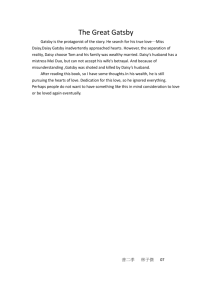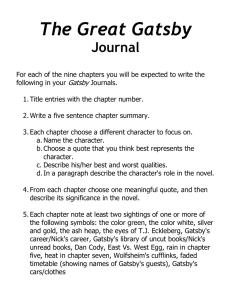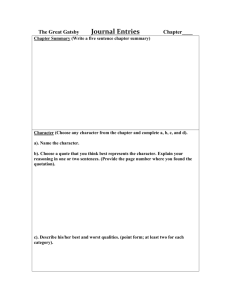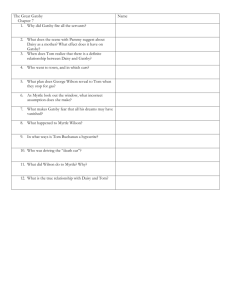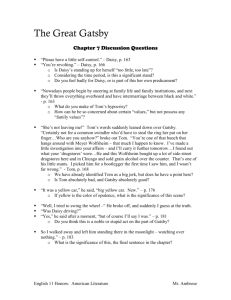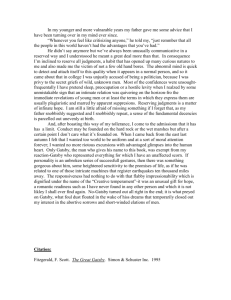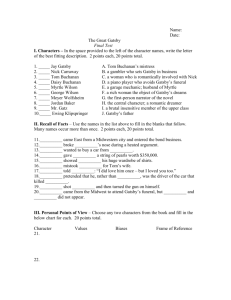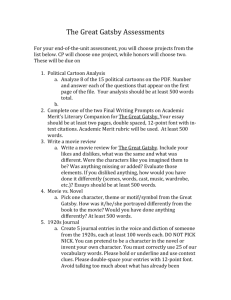The Great Gatsby – Quotes - H
advertisement
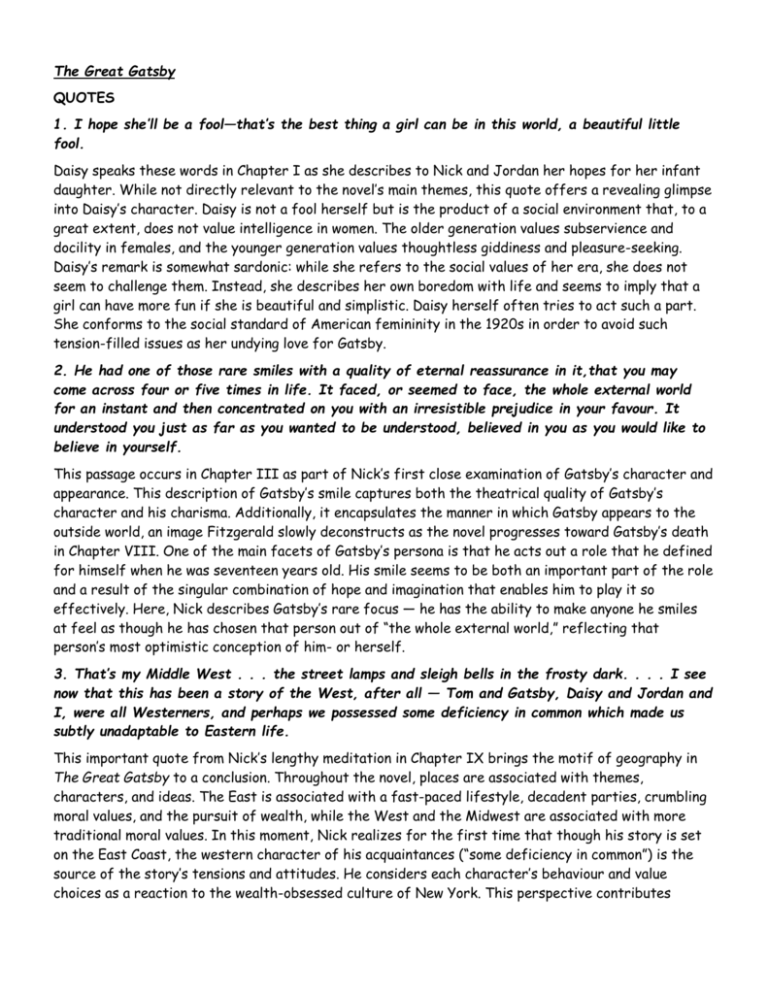
The Great Gatsby QUOTES 1. I hope she’ll be a fool—that’s the best thing a girl can be in this world, a beautiful little fool. Daisy speaks these words in Chapter I as she describes to Nick and Jordan her hopes for her infant daughter. While not directly relevant to the novel’s main themes, this quote offers a revealing glimpse into Daisy’s character. Daisy is not a fool herself but is the product of a social environment that, to a great extent, does not value intelligence in women. The older generation values subservience and docility in females, and the younger generation values thoughtless giddiness and pleasure-seeking. Daisy’s remark is somewhat sardonic: while she refers to the social values of her era, she does not seem to challenge them. Instead, she describes her own boredom with life and seems to imply that a girl can have more fun if she is beautiful and simplistic. Daisy herself often tries to act such a part. She conforms to the social standard of American femininity in the 1920s in order to avoid such tension-filled issues as her undying love for Gatsby. 2. He had one of those rare smiles with a quality of eternal reassurance in it,that you may come across four or five times in life. It faced, or seemed to face, the whole external world for an instant and then concentrated on you with an irresistible prejudice in your favour. It understood you just as far as you wanted to be understood, believed in you as you would like to believe in yourself. This passage occurs in Chapter III as part of Nick’s first close examination of Gatsby’s character and appearance. This description of Gatsby’s smile captures both the theatrical quality of Gatsby’s character and his charisma. Additionally, it encapsulates the manner in which Gatsby appears to the outside world, an image Fitzgerald slowly deconstructs as the novel progresses toward Gatsby’s death in Chapter VIII. One of the main facets of Gatsby’s persona is that he acts out a role that he defined for himself when he was seventeen years old. His smile seems to be both an important part of the role and a result of the singular combination of hope and imagination that enables him to play it so effectively. Here, Nick describes Gatsby’s rare focus — he has the ability to make anyone he smiles at feel as though he has chosen that person out of “the whole external world,” reflecting that person’s most optimistic conception of him- or herself. 3. That’s my Middle West . . . the street lamps and sleigh bells in the frosty dark. . . . I see now that this has been a story of the West, after all — Tom and Gatsby, Daisy and Jordan and I, were all Westerners, and perhaps we possessed some deficiency in common which made us subtly unadaptable to Eastern life. This important quote from Nick’s lengthy meditation in Chapter IX brings the motif of geography in The Great Gatsby to a conclusion. Throughout the novel, places are associated with themes, characters, and ideas. The East is associated with a fast-paced lifestyle, decadent parties, crumbling moral values, and the pursuit of wealth, while the West and the Midwest are associated with more traditional moral values. In this moment, Nick realizes for the first time that though his story is set on the East Coast, the western character of his acquaintances (“some deficiency in common”) is the source of the story’s tensions and attitudes. He considers each character’s behaviour and value choices as a reaction to the wealth-obsessed culture of New York. This perspective contributes powerfully to Nick’s decision to leave the East Coast and return to Minnesota, as the infeasibility of Nick’s Midwestern values in New York society mirrors the impracticality of Gatsby’s dream. 4. Gatsby believed in the green light, the orgastic future that year by year recedes before us. It eluded us then, but that’s no matter — tomorrow we will run faster, stretch out our arms farther. . . . And then one fine morning — So we beat on, boats against the current, borne back ceaselessly into the past. These words conclude the novel and find Nick returning to the theme of the significance of the past to dreams of the future, here represented by the green light. He focuses on the struggle of human beings to achieve their goals by both transcending and re-creating the past. Yet humans prove themselves unable to move beyond the past: in the metaphoric language used here, the current draws them backward as they row forward toward the green light. This past functions as the source of their ideas about the future (epitomized by Gatsby’s desire to re-create 1917 in his affair with Daisy) and they cannot escape it as they continue to struggle to transform their dreams into reality. While they never lose their optimism (“tomorrow we will run faster, stretch out our arms farther . . .”), they expend all of their energy in pursuit of a goal that moves ever farther away. This apt metaphor characterizes both Gatsby’s struggle and the American dream itself. Nick’s words register neither blind approval nor cynical disillusionment but rather the respectful melancholy that he ultimately brings to his study of Gatsby’s life. Who says the following to whom and under what circumstances? 1) "Gatsby turned out all right at the end; it is what preyed on Gatsby, what foul dust floated in the wake of his dreams that temporarily closed out my interest in the abortive sorrows and short-winded elations of men." (p.4) 2) "All right... I'm glad it's a girl. And I hope she'll be a fool - that's the best thing a girl can be in this world, a beautiful little fool." (p.13). 3) "Everyone suspects himself of at least one of the cardinal virtues, and this is mine: I am one of the few honest people that I have ever known." (p.39). 4) "There must have been moments even that afternoon when Daisy tumbled short of his dreams not through her own fault but because of the colossal vitality of his illusion." (p.61). 5) "Can't repeat the past?" he cried incredulously. "Why of course you can." (p.70). 6) "There is no confusion like the confusion of a simple mind..." (p.79). 7) "I suppose the latest thing is to sit back and let Mr Nobody from Nowhere make love to your wife. Well, if that's the idea you can count me out..." (p.83). 8) "They're a rotten crowd.... You're worth the whole damn bunch put together." (p.98). 9) "They were careless people, Tom and Daisy - they smashed up things and creatures and then retreated back into their money or their vast carelessness or whatever it was that kept them together, and let other people clean up the mess they had made." (p.114). 10) "So we beat on, boats against the current, borne back ceaselessly into the past." (p.115).

